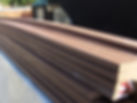Composite Wood Imports Must Be TSCA Compliant by March 2019
- Admin
- Dec 13, 2018
- 1 min read
Updated: Dec 15, 2018

The EPA’s December 2016 national ruling to reduce exposure to formaldehyde emissions from certain wood products produced by domestically and imported into the U.S. is going into effect starting June 1, 2018. From June 1, 2018, composite wood products that are manufactured in or imported into the U.S. are required to be compliant with the California Air Resources Board’s Airborne Toxic Control Measures Phase II emission standards (CARB ATCM Phase II) or Title VI of the Toxic Substances Control Act (TSCA Title VI). However, beginning March 22, 2019, composite wood products must be labeled as TSCA Title VI compliant.
According to the EPA, composite wood products affected by this ruling are wood products created by binding strands, particles, fibers, veneers, or boards of wood together with adhesives (i.e., glues). There are three composite wood products that are regulated under TSCA Title VI: hardwood plywood, medium-density fiberboard (includes thin-MDF), and particleboard. These composite wood products are commonly used in the manufacture of furniture, kitchen cabinets, flooring, picture frames and wooden children’s toys, among other products.
Starting June 1, 2018, compliant wood products are required to be labeled as CARB ATCM Phase II or TSCA Title VI, and after March 22, 2019, composite wood products are required to be labeled as TSCA Title VI compliant. The label on composite wood panels must include the fabricator’s name, the date the finished good was produced (in month/year format), and a TSCA Title VI compliance statement. If the product is imported, the label would have to be affixed to the product by the date of importation.
To learn more visit: https://www.epa.gov/formaldehyde/formaldehyde-emission-standards-composite-wood-products